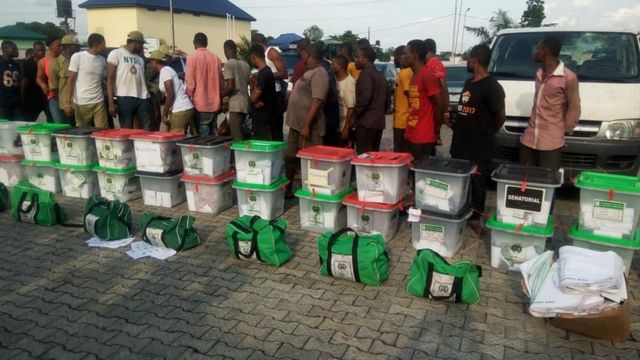Nigeria’s extractive industry is almost akin to a crime scene. Just as the country loses billions of dollars annually to crude oil theft, its natural resources in the solid minerals sector face similar plundering. Described as the next oil, this sector is metaphorically positioned as Nigeria’s potential next major income earner.
Geo-scientific data estimates Nigeria’s solid minerals wealth at about $750 billion. However, Nigerian authorities believe that further surveys will reveal even greater wealth. Dr. Oladele Alake, Minister of Solid Minerals Development, disclosed that a preliminary survey by GeoScan, a German company, estimated $750 billion worth of minerals under Nigerian soil. Yet, he emphasized that this figure is conservative.
“That is a conservative estimate. When we conduct a serious, accurate data exploration, we will discover trillions of solid minerals embedded under it. By the time we are done with all of these efforts, input, and policies we are putting in place, trillions of naira will be child’s play, and we will be nudging trillions of dollars,” Alake said.
Nigeria is home to about 44 solid minerals in commercial quantities. All 36 states of the federation and Abuja, the capital city, possess at least one or more of these minerals. Notable examples include gold, diamond, lead, zinc, iron ore, coal, topaz, bitumen, marble, granite, talc, bauxite, tantalite, uranium, gemstones, feldspar, gypsum, barite, dolomite, and kaolin. Additionally, Nigeria has minerals crucial for energy transition, such as lithium, cobalt, copper, and manganese.
Nigeria has a policy of not mining uranium due to its radioactive nature, among other reasons.
Before independence in 1960, mining solid minerals such as coal, columbite, tin, lead, and zinc contributed about 45 percent to the country’s Gross Domestic Product (GDP). Today, solid minerals contribute less than five percent to the GDP. The focus on oil and the lack of political will to control illegal mining meant that Nigeria failed to accrue necessary income from exploiting its mineral resources.
Edosa Oviawe, Programmes Manager at Global Rights, an international non-governmental organization advocating for justice and sustainability in the extractive industry, states that the discovery of oil in Oloibiri in 1956, combined with coal’s role in sustaining the Biafra war effort, diverted Nigeria’s attention from solid minerals. This neglect allowed various unregulated actors to dominate the sector.
“Historically, we’ve seen how the sector has suffered neglect due to our over-concentration on oil in Nigeria. But this sector offers us an opportunity for growth, national growth, and development over time,” Oviawe said.
However, this scenario is set to change. In its first year in office, the federal government is demonstrating the political will necessary to sanitize operations within the solid minerals industry. Dr. Oladele Alake, the Minister of Solid Minerals Development, emphasized at various forums over the last ten months that the industry is poised to become the nation’s next cash cow after oil. He stated that the governance structures to realize this vision are being established, with a focus on sanitizing the sector.
In April this year, at the inauguration of the New Headquarters Naval Training Command in Rivers State, the Speaker of the House of Representatives, Tajudeen Abbas, noted that Nigeria loses an estimated 300,000 barrels of crude oil per day to theft and vandalism, amounting to about N1.29 trillion annually.
While it is easier to track losses in the oil sector due to its development over the past six decades, the solid minerals sector is different due to long neglect and inadequate monitoring. About 80 percent of mining in Nigeria is done by artisanal miners, whose operations are largely unregulated. The Nigeria Extractive Industries Transparency Initiative (NEITI) estimates losses from illegal mining at $2 billion to $3 billion annually, though other estimates suggest a much higher figure.
NEITI’s Director of Technical, Dr. Dieter Bassi, indicated that the country loses $2 billion to $3 billion annually due to unregulated artisanal mining and illicit foreign involvement. Due to porous borders, many foreign nationals engage in illegal mining and exportation, often profiting intermediaries rather than the miners themselves.
Former Minister of State for Mines and Steel Development, Uche Ogah, claimed that about $9 billion worth of gold is illegally extracted from Nigeria annually, often transported through private jets. Dr. Alake corroborated these claims, stating that influential Nigerians collaborate with illegal miners, contributing to economic sabotage.
In November 2023, the House of Representatives resolved to investigate illegal mining, which costs the federal government $9 billion annually, with only three percent of royalties paid by licensed miners. The federal government has since revoked 2,531 mineral titles due to payment defaults and license racketeering. Additionally, a Mining Marshal force, initially comprising 2,220 personnel from the Nigeria Security and Civil Defence Corps (NSCDC), has been established to combat illegal mining. This force is expected to grow with personnel from other security services to wage a comprehensive battle against mineral theft.
Since the inauguration of the Mining Marshals, over 200 illegal mining suspects have been arrested, with 133 prosecutions ongoing. Seized minerals and equipment have been confiscated and forfeited to the federal government.
Recent operations have led to arrests and the sealing of illegal mining sites. For instance, in the Federal Capital Territory (FCT), three suspects were arrested, and an illegal lithium mining site was sealed, where over 2,000 tonnes of lithium were discovered. In Nasarawa State, four Chinese nationals were arrested at an illegal lithium mining site.
The Economic and Financial Crimes Commission (EFCC) has also been active in combating illegal mining. In February, the Ilorin Zonal Command arrested 41 suspects and impounded 12 trucks involved in illegal mining.
The federal government’s efforts to reform the solid minerals sector, including establishing a robust regulatory framework and combating illegal mining, aim to significantly increase the sector’s contribution to Nigeria’s GDP. Minister Alake is optimistic that these reforms will elevate the solid minerals sector to become Nigeria’s primary income earner, potentially contributing 50 percent to the GDP. This is a bold target, given that the sector currently contributes only 0.63 percent to the GDP.








